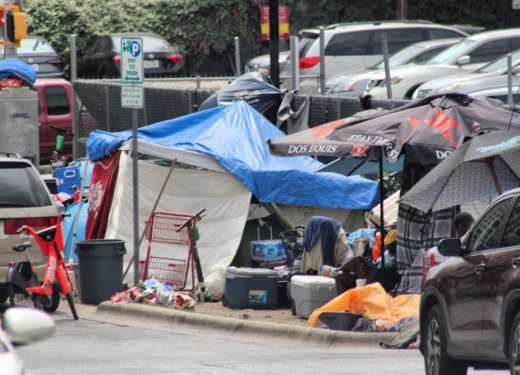Austin officials on May 11 shared more details on the city's phased approach to enforcing the homelessness ordinances enacted through Proposition B's passage earlier this month.
The city's four-step plan, beginning with several weeks focused mainly on community education and verbal warnings from Austin Police Department officers, is now in effect. This first phase centered on outreach will run through June 12 and will be followed by a second phase June 13-July 10 shifting to written warnings and some citation issuance from APD as education continues. The phased plan applies to all components of the Proposition B ordinances, including bans on public camping, aggressive panhandling, and sitting, lying down or sleeping in certain spaces downtown.
Beginning July 11, possible arrests and the clearing of unregulated encampments will be targeted in places where APD citations have not resulted in compliance. If necessary, such clearings will begin with the posting of 72-hour warnings at encampments followed by citations or arrests.
Homeless Strategy Officer Dianna Grey said clearings will also be preceded by several visits from outreach teams informing unsheltered residents of the impending process and offering personal storage and service opportunities. Campsite clearings will be followed by Austin Resource Recovery or Austin Public Works cleanups, Grey said.
While the plan's third and fourth phases could result in more stringent legal enforcement, interim Police Chief Joseph Chacon said APD will issue citations or arrests "as a last resort." Chacon and Grey also noted that individuals cited for ordinance violations will be sent through the Downtown Austin Community Court to facilitate a diversion process involving social service connections rather than an immediate trip to jail.
"We want to do the education and outreach first to educate our full community, and particularly our community of folks that are experiencing homelessness, about what we’re trying to accomplish and what the voters have decided and to do it in a safe and humane manner. To give people an opportunity to make plans if they need to move and then give them places that they can move to," Chacon said.
Chacon said APD and other city departments involved in the plan will evaluate strategies in use throughout each of the four-week phases, and a full review of the process will take place once the plan concludes in late summer.
As the education and enforcement rollout moves forward, officials said they are also keeping a focus on connecting people experiencing homelessness with supportive and affordable housing opportunities.
"We will not lose sight of the community’s primary challenge around homelessness, and that is to create real solutions to help people end their episode of homelessness and get back into housing with the services they need to stay there," Grey said.
City Manager Spencer Cronk's first report on potential sanctioned campsites throughout Austin is due to City Council on May 14, and that concept may be further solidified this summer as well—although Cronk said staff are considering a "broader spectrum" of options such as using existing community partners and shelters to supplement the designated campground concept.
Following city officials' overview May 11, representatives of some city groups supporting Proposition B's passage spoke out against the phased plan's timeline and intent.
"The camping ban was in effect for 23 years; it should not require 60 days to put it back in place and restore public safety and public health to our city," Matt Mackowiak and Cleo Petricek, co-founders of the Save Austin Now political action committee behind Proposition B, said in a statement.
Leaders with the Downtown Austin Alliance advocacy partnership also held a virtual press conference Tuesday afternoon to express concerns about enforcement, timing and the possible use of city park space for new, regulated campgrounds.
Bill Brice, vice president of investor relations at the Downtown Alliance, said the city's "slow play" toward enforcing bans on camping, panhandling and sleeping outdoors does not represent the intent of Austinites who favored Proposition B and sustains the difficulties faced by people experiencing homelessness on the streets.
"What we’re hearing is, our businesses and other employers ... are being set back. We’ve got to act quicker. I think that the fact that we’re saying, ‘The voters have spoken, but now we’ve got three months of process’ does not answer the call of the voters we’re seeking," Brice said.





